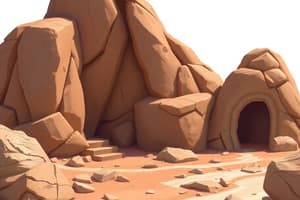Podcast
Questions and Answers
What is the type of clay?
What is the type of clay?
- Sedimentary (correct)
- Igneous
- Metamorphic
- None of the above
Older clays have lower strength than younger clays.
Older clays have lower strength than younger clays.
False (B)
What are the typical UCS (Unconfined Compressive Strength) values for clay?
What are the typical UCS (Unconfined Compressive Strength) values for clay?
- 1-20 MPa (correct)
- 0.1-1 MPa
- 100-200 MPa
- 50-100 MPa
What is the SBP (Soil Bearing Pressure) of clay?
What is the SBP (Soil Bearing Pressure) of clay?
What kind of material is clay?
What kind of material is clay?
Clay is prone to slow creep and deformation.
Clay is prone to slow creep and deformation.
Compaction in clay can cause high and differential settlement under structure load.
Compaction in clay can cause high and differential settlement under structure load.
Flashcards
Sedimentary rock
Sedimentary rock
A type of rock formed from sediments that have been cemented together.
Clastic rock
Clastic rock
A rock made up of small fragments of other rocks.
Argillaceous rock
Argillaceous rock
A type of sedimentary rock made primarily from clay minerals.
Strength
Strength
Signup and view all the flashcards
Unconfined compressive strength (UCS)
Unconfined compressive strength (UCS)
Signup and view all the flashcards
Shear bond strength (SBP)
Shear bond strength (SBP)
Signup and view all the flashcards
Clay foundation
Clay foundation
Signup and view all the flashcards
Creep
Creep
Signup and view all the flashcards
Compaction
Compaction
Signup and view all the flashcards
Differential settlement
Differential settlement
Signup and view all the flashcards
Study Notes
Clay Properties
- Type: Sedimentary, clastic, argillaceous
- Strength: Older, more lithified, and unweathered clays have higher strength. Younger clays have properties transitional to low-strength soils.
- Unconfined Compressive Strength (UCS): 1–20 MPa
- Sensitivity and Bearing Pressure (SBP): 0.1–1 MPa
Clay Foundation Considerations
- Foundations: Weak material with low, variable strength largely due to water content.
- Potential Issues: Prone to slow creep and plastic deformation. High potential for compaction leading to high and differential settlement under structural loads.
Studying That Suits You
Use AI to generate personalized quizzes and flashcards to suit your learning preferences.




